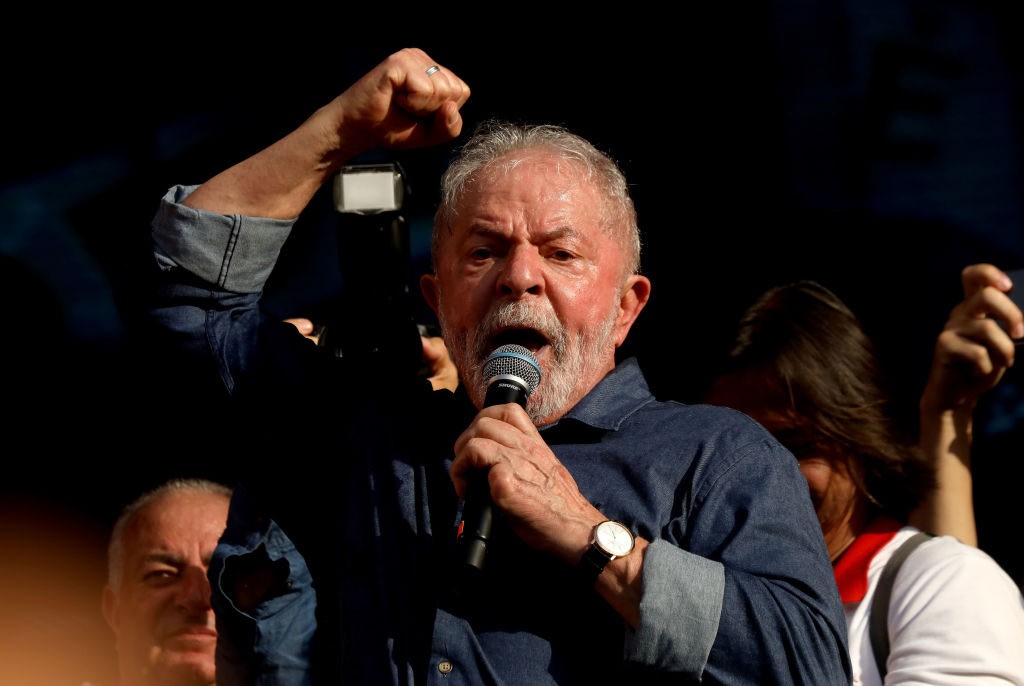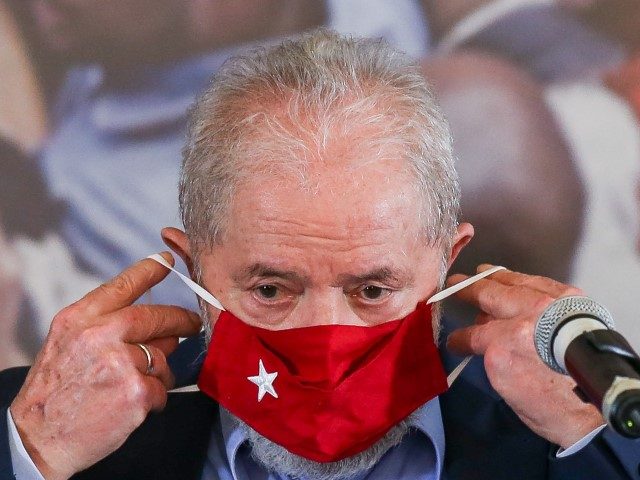Brazilian ex-President Luiz Inácio Lula da Silva, a socialist running for president again this year after his judicial appointees overturned a 25-year prison sentence for corruption, used a campaign rally this weekend to promote the creation of a pan-American currency.
The leftist outlet Telesur quoted Lula on Monday as describing the continental currency as a way to liberate Latin America from reliance on the U.S. dollar and a way of improving Brazil’s relations with its neighbors. He appeared to be promoting a proposal that surfaced in early April in the pages of the far-left Folha de Sao Paulo newspaper, proposed by fellow Workers’ Party (PT) presidential candidate Fernando Haddad, for a currency called the “Sur” [“South”] functioning throughout South America the way that the Euro works on the European continent.
The Folha article argued that Russia’s vulnerability to sanctions in the face of its full-scale invasion of Ukraine is evidence that South America needs its own united currency to protest itself from Western sanctions on human rights grounds.
Lula enjoyed months as the frontrunner in October’s Brazilian presidential election despite his corruption conviction but has seen his lead decline dramatically over the past week against incumbent conservative President Jair Bolsonaro. This weekend was particularly embarrassing for Lula as his rally on Sunday, a Marxist holiday known as “May Day” or “International Workers’ Day,” attracted a meager crowd while conservatives organized massive pro-Bolsonaro, free speech rallies in the country’s largest cities.
Lula promoted the “Sur” idea in remarks on Saturday, according to Telesur, essentially framing its creation as a campaign promise.

Former president of Brazil Luiz Inacio Lula da Silva speaks during a labour day demonstration to support him on May 1, 2022 in Sao Paulo, Brazil. (Rodrigo Paiva/Getty Images)
“We are going to restore our relationship with Latin America. God willing, we will create a Latin American currency,” Lula reportedly asserted. “We don’t have to depend on the dollar.”
Lula presented the proposal at the congress of the Socialism and Liberty Party (PSOL), a smaller national party with ideological similarities to Lula’s PT. A registered member nearly stabbed Bolsonaro to death during a rally in September 2018, a month before he became president – leaving his digestive system with long-term damage that has required multiple surgeries and hospitalizations.
The proposal of the “Sur” most recently resurfaced as a column by Haddad, who lost the 2018 presidential election as a PT candidate against Bolsonaro, and the former president of the Banco Fator, Gabriel Galipolo, in the pages of Folha de Sao Paulo. Haddad was previously mayor of Sao Paulo, Brazil’s largest city, before running for president while Lula was in prison.
The Folha column, published on April 1, argued that Western sanctions against Russia for launching a full-scale invasion of Ukraine in February show the need to protect from sanctions – implicitly making the case that Latin American countries will commit the kinds of human rights violations and war crimes that the Russian sanctions are meant to combat.
“The recent conflict between Russia and Ukraine has rekindled old fears that had died down at the end of the Cold War. The possibility of a war involving nuclear powers continues to threaten human existence, and the disrespect for national sovereignty haunts states that do not have the same war power,” the authors wrote. “The use of currency power at the international level renews the debate about its relationship with sovereignty and the capacity for self-determination of peoples, especially for countries with currencies considered non-convertible.”
“As they are not accepted as a means of payment and as a store of value in the international market, their managers are more subject to the limitations imposed by the volatility of the international financial market,” the authors argued.
A common South American currency, they concluded, “is capable of forming an economic bloc with greater relevance in the global economy and granting greater freedom to democratic desire, to the definition of the economic destiny of the bloc’s participants and to the expansion of monetary sovereignty.”
“The creation of a South American currency is a strategy to accelerate the process of regional integration … it is a fundamental step on the road towards the strengthening of sovereignty and regional governance,” the article claimed.
The authors described the Sur as a “digital” currency, though the use of major banking institutions would distinguish it from other digital currencies such as Bitcoin, which is currently the official currency of El Salvador. They did not name individual countries other than Brazil that would be prime candidate, though presumably the other South American states – as disparate as the continent’s highest economic performer, Chile, and arguably the world’s worst economy, Venezuela – would be invited.
The Argentine newspaper Clarín analyzed the proposal on Monday, noting that many of the prime candidates to join a “Sur” currency are heavily dependent on the dollar, including Venezuela.
Although a large part of the countries of Latin America have their own currencies, there are other countries that have abandoned their respective currencies, like the cases of El Salvador and Ecuador [which uses the U.S.dollar],” Clarín observed. “Others – like Panama, Argentina, and Venezuela – have de facto or de jure use of American currency… although Venezuela, Argentina, and Panama still count on their own coin, the weight of the U.S. dollar on their monetary policies is critical.”
Abandoning their reliance on the dollar for an unknown would be a major risk.
The most similar economic experience to the “Sur” proposal – the Euro currency – has faced major challenges on the basis of how different the economic circumstances of member countries were upon joining the economic coalition. The strongest countries economically, most notably Germany, wield outsized influence on controlling the currency, leaving countries with extremely weak economic profiles like Greece at a loss. Many economics experts have expressed regret in the past decade that the Eurozone welcomed Greece’s economic to the coalition; a similar relationship between Venezuela and, for example, Chile to that of Greece and Germany is not impossible.
Lula’s dramatic attempt to change the current Brazilian election conversation follows a week of sudden bad news for the frontrunner, which most political experts considered likely to defeat Bolsonaro. A poll by the Ipespe research firm published on April 22 found that Lula enjoyed a 14-percent lead against Bolsonaro, 45 percent to 31 percent. On April 29, the firm PoderData published a national poll showing Lula with 41 percent of the vote to Bolsonaro’s 36 percent – a five-percent difference.
This week, polling showed Bolsonaro leading against Lula in the country’s largest urban region, Sao Paulo, a result the magazine Veja called “a nightmare for Lula.”

COMMENTS
Please let us know if you're having issues with commenting.